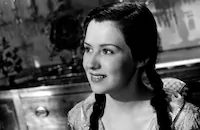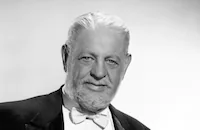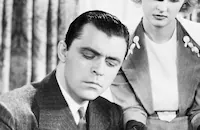One Too Many
Cast & Crew
Erle C. Kenton
Ruth Warrick
Richard Travis
Ginger Prince
Rhys Williams
William Tracy
Film Details
Technical Specs

Synopsis
In Central City one morning, Eagle Gazette reporter Bob Mason and photographer Bill Leighton are assigned to cover a disgraceful brawl between local mayoral candidate Frank Emery and another patron at Sully's bar. The newspaper's publisher, Simes, a staunch prohibitionist, insists on running the story on the front page, even though it will destroy the politician's career. That night, after Bob's wife Helen plays the piano and sings her daughter Ginger to sleep, she takes a drink to forget the depressing memories that occupy her. Bob returns home later to find Helen passed out in the kitchen. The next morning, although Helen is shaking and admits she had too much to drink, she begins to scour the house looking for another bottle. When Ginger runs home from school crying because her classmates have said Helen is a drunk, Helen becomes distraught and prompts Bob to seek the help of local bartender Michael H. "Sully" Sullivan, a recovering alcoholic. After Helen admits that she has a problem, Sully explains this is the first step in Alcoholics Anonymous (AA), a program that immediately helps at least fifty percent of those who enroll. Bob agrees to take the next step in the program by asking Dr. Foster for help and accepting Mrs. Sullivan offer to watch over Helen as she goes through withdrawal. Sully explains to Bob that he met his wife in AA and that, although there is no cure for alcoholism, Sully and his wife have managed to build a life together by living from day to day. Sometime later, Helen has achieved sobriety and, convinced that she is cured, Bob tells Sully that Helen will not embarrass herself by attending AA meetings. Sully then wonders if it is Bob and not Helen who is embarrassed by his wife's condition. Meanwhile at home, Helen, frustrated by her daily routine and her daughter's need for attention, mixes herself a drink from a hidden bottle of alcohol. That night, Helen meets her old friend, band leader Walt Williams, at the nearby Trocadero nightclub, and becomes increasingly drunk. When Walt reminisces about her great talent as a pianist, Helen refuses to admit that she misses performing. Walt reminds her that she did not drink when she was playing regularly. That evening at the newspaper offices, after Simes gives Bob a raise, a drunken Helen suddenly stumbles into the office and shamelessly insults Simes. Bob is then forced to admit Helen to the New Hope Institute for rehabilitation. Days later, Walt visits with Ginger and tries to cheer her up by accompanying her on the piano as she sings a song. Bob interviews a doctor at the hospital about alcoholism and discovers that though moderate drinking is acceptable, alcoholism is a great societal problem and a disease. After Helen is discharged from the hospital, Bob drives her home in his car. When he stops at a gas station along the way, however, Helen, bitter about her treatment, runs away. Meanwhile, Jack, having lost the election in a record landslide, becomes drunk and belligerent and kills himself. When Simes finds out that Bob was too busy with his alcoholic wife to cover the suicide, he fires both Bob and Leighton. Meanwhile, Helen returns to the house drunk and disheveled, takes Ginger and the child's piggy bank and drives off to buy more alcohol, but passes out at the wheel, nearly killing herself and her daughter. When Helen is committed to the psychiatric ward, Bob begins a campaign to convince Simes to publish articles about alcoholism and gathers a distinguished group of religious, business and community leaders to aid him. At first Simes refuses, claiming that he does not want to help a "bunch of drunks," but when Mrs. Adams, the temperance society president, states that it is a public responsibility to provide adequate care for alcoholics, Simes finally agrees to help. Mrs. Sullivan visits Helen at the hospital to remind her that faith in a higher power will help her in her time of need. Although Helen is reluctant to espouse any religion, when she returns home, she is moved to find Ginger praying to God to give her mother strength. Helen then asks Sully to take her to an AA meeting. Weeks later, at a campaign benefit, Walt encourages Helen to play a piano recital to follow Ginger's tap routine and performances by The Harmonaires. Helen agrees to perform and, when Walt introduces her to the Central City audience as a great concert pianist, her talent surprises everyone, especially Simes. While Helen happily plays, Ginger tells her father, "Hasn't God been good to us."

Director
Erle C. Kenton
Cast

Ruth Warrick

Richard Travis
Ginger Prince

Rhys Williams
William Tracy

Onslow Stevens
Mary Young

Thurston Hall
Larry J. Blake
Victor Kilian
"buzzy" Bookman
Cecile Elliott
Lester Sharpe
Luther Crockett
Gilbert Fallman
Lelah Tyler
Helen Spring
Harry Stanton

Lyle Talbot
The Harmonaires
Louis Da Pron
Ern Westmore
Carlos Molina And His Orchestra
George Eldredge
Roy E. Butler
Harry Hines
Jack Reitzen
Robert Malcolm
Wm. Baldwin
Dan Rense
William Kahn
Sara Perry
Eddie Parker
Tony Layng
Bobo Scharffe
Jane Hampton
Claire James
Crew
Kroger Babb
Kroger Babb
Curly Batson
Carl Berger
Irving Bibo
Malcolm Stuart Boylan
Margaret "bobbe" Burger
Leigh H. Carson
John Carter
David Chudnow
Bill Copeland
Jack Dewitt
Jack Dowsing Jr.
Nelly Goletti
Nelly Goletti
Robert Hansard
The Harmonaires
Emery Hoerger
Mildred A. Horn
Bunny Lewis
C. Kenneth Lobben
Kitty Mager
Edward Mann
Martin Obzina
Dr. David L. Olinger
Betty Pedretti
Bert Shefter
John Stephens
William Stephens
Henry C. Stowell
Glen P. Thompson
Ern Westmore
Mary Gibson Whitlock
Mack V. Wright

Film Details
Technical Specs

Articles
Ruth Warrick (1915-2005) - Ruth Warrick, (1915-2005)
She was born on June 29, 1915 in St. Joseph, Missouri. After attaining a degree in theatre from the University of Kansas City, she left for New York, where in 1938, she joined the Mercury Theater troupe, headed by a young artist on the rise by the name of Orson Welles. When Welles prepared to film Citizen Kane (1941) he took several players from his Mercury Theater (Joseph Cotten, Everett Sloan, Agnes Moorehead) and of course, Ruth Warrick. She made her film debut in Welles' cinematic epic as Emily Norton Kane. Indeed, to many film buffs, Warrick's icy charms are indispensable to the celebrated montage sequence opposite Welles at the breakfast table; particularly when he broaches the subject of her husband's infidelity:
Emily Kane: Charles, people will think...
Charles Kane: What I tell them to think!
Warrick received fine reviews for her performance, and she had good roles in her next two films The Corsican Brothers (1941), with Douglas Fairbanks Jr., and Journey Into Fear (1942), opposite Joseph Cotton. Sadly, Hollywood, not knowing what to do with a well-trained, mature actress like Warrick, began to cast her into routine, forgettable fare: Mr. Winkle Goes to War (1944), China Sky (1945), and Swell Guy (1946). Disney's Song of the South (1947), was a box-office hit, and was her best film in a while, but overall, the material she received over the next few years, simply wasn't worthy of her talents.
Things turned around for her in the mid-50s, when Warrick discovered the medium of television. She had regular roles on The Guiding Light (1953-54), As the World Turns (1956-60), Father of the Bride (1960-61), and was unforgettable as the sinister housekeeper, Hannah Cord, in Peyton Place (1965-67). Yet it was her 35-year run in the role of Phoebe Wallingford in All My Children (1970-2005), that Warrick achieved her greatest triumph. As the rich, intrusive matriarch of the fictitious, affluent town known as Pine Valley, Warrick found a role that could be at once gloriously hammy and quietly conniving - qualities that highlighted her renown versatility as an actress. To honor her contribution to television, Warrick received a lifetime achievement award from the Daytime Emmys last December. She is survived by three children, a grandson, and six great-grandchildren.
by Michael T. Toole

Ruth Warrick (1915-2005) - Ruth Warrick, (1915-2005)
Quotes
Trivia
Notes
This film was also reviewed under the title The Best Is Yet To Come. The opening title card reads, "World's Largest Roadshow Hallmark Organization proudly presents The Important Story of Alcoholism (one of the world's most serious and prevalent diseases today)." A October 24, 1951 Daily Variety article states that producer Kroger Babb changed the title from One Too Many to The Best Is Yet To Come, because One Too Many failed to attract a significant audience. However, the new title did not improve audience attraction and the film was withdrawn from release, pending a new title. According to a January 19, 1955 Hollywood Reporter article, the film had been market-tested but had still not been nationally released. A August 3, 1955 Hollywood Reporter article states that the film was in release in 1955 under the title Mixed-Up Women.
The cast listed in the opening credits differ in order from the end credits. The film opens and closes with voice-over narration by Rhys Williams as the character "Sully."














